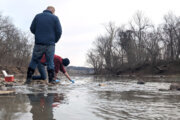When the Trump Administration proposed slashing funding for the federal Chesapeake Bay program by 90 percent earlier this year, area lawmakers and environmentalists were concerned and dismayed.
But lawmakers on Capitol Hill seem to be taking a different stance.
A Senate subcommittee in September approved a $3-million increase – to $76 million – in the next round of budget bills. Lawmakers in the House have approved even more, so it’s unclear what the final number could be as negotiations continue. The current continuing resolution expires on Nov. 20, so things could still change between now and then.
“By working together we’ve seen the first increase in the Chesapeake Bay program funding in a long time,” said Senator Chris Van Hollen, D-Md. “Now it ain’t over until it’s over. We need to make this part of the budget that passes this year.”
Members of Maryland’s congressional delegation — Sens. Ben Cardin and Van Hollen and Rep. Steny Hoyer — met with Environmental Protection Agency officials Tuesday to discuss the bay’s funding status.
Sen. Ben Cardin, a Democrat, said the meeting comes at a critical time, as the EPA is reviewing reports of the implementation plans for each of the states.
Van Hollen said the delegation is working hard to increase funding for the EPA’s Chesapeake Bay Program, a regional partnership that includes Delaware, Maryland, New York, Pennsylvania, Virginia, West Virginia, D.C. and the Chesapeake Bay Commission.
“Sen. Cardin and I pushed back very hard, and we were able to get an increase in the Senate of $3 million, and the House increased it by even more,” Van Hollen said.
Chesapeake Bay Foundation Executive Director Jason Rano said in a statement that annual increases, such as the boost in funding, “are essential” to meeting the 2025 deadline to restore the health of the Bay.
“We need to make this part of the budget that passes this year,” Van Hollen said.
One of the issues Cardin raised during the meeting included Pennsylvania’s contribution to the reduction of pollutants in the Bay. Cardin said the questions were to ensure Pennsylvania will be held accountable to do its share.
The Chesapeake Bay Foundation, which tracks pollution in the bay, released in May a critical report of Pennsylvania’s efforts to reduce pollution, calling it “woefully inadequate,” The Associated Press reported.
Cardin said they received a detailed report on what the EPA is doing with regard to the Conowingo Dam on the Susquehanna River in Maryland and potential use of the sediment the dam traps.
During storms, the dam releases sediments into the Bay, and there was discussion on whether to hold Pennsylvania and Exelon Corp. — which owns the dam — accountable, Cardin said.
“The Chesapeake Bay program depends on the stakeholders doing their share,” Cardin said.
Hoyer said the discussion is another exclamation point on what needs to get done.
“This is an extraordinary resource of our state, an extraordinary resource of the nation,” Hoyer said.
“We have a responsibility, federal, state, and local, to ensure the health and welfare of the Chesapeake Bay.”









